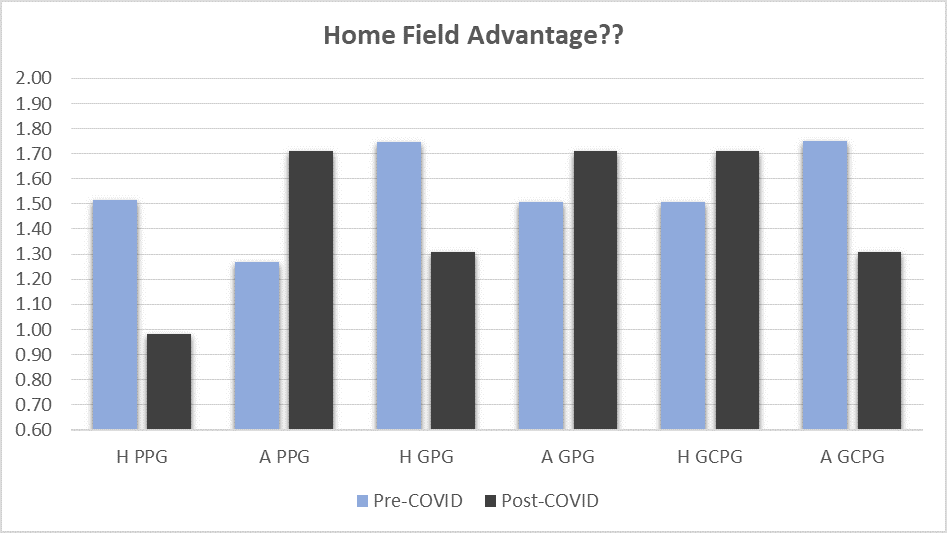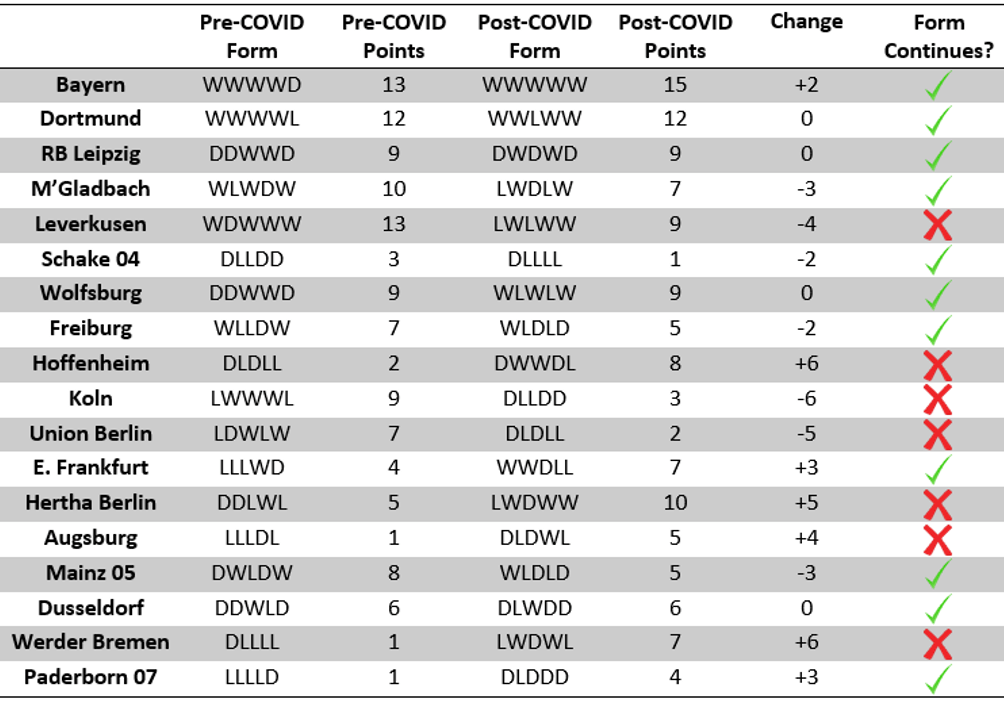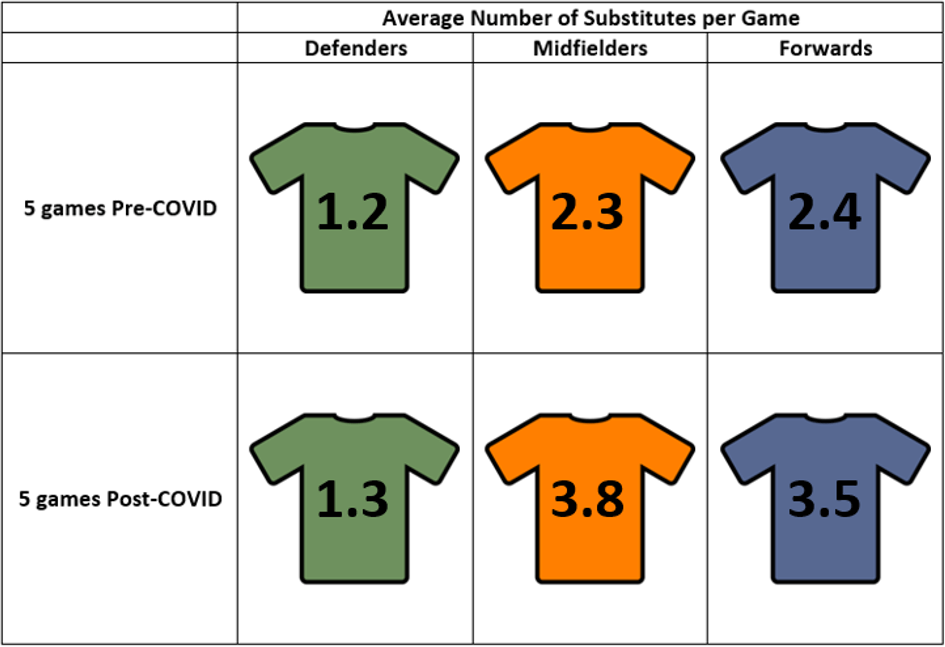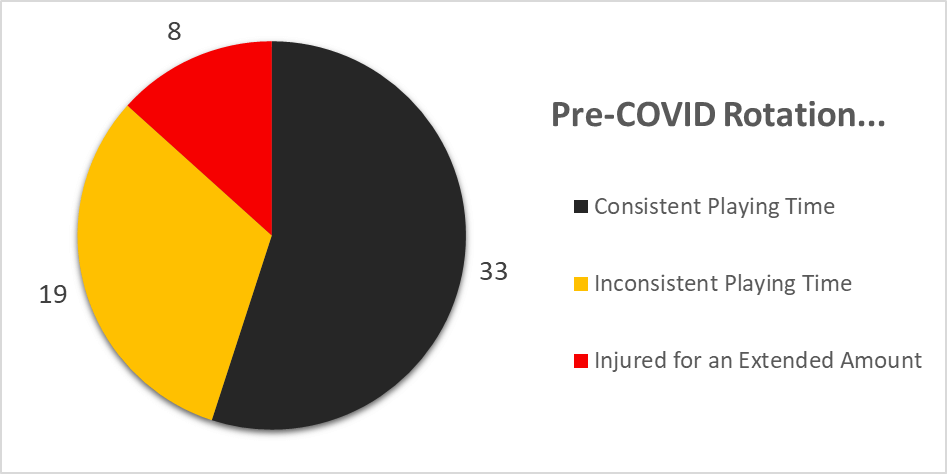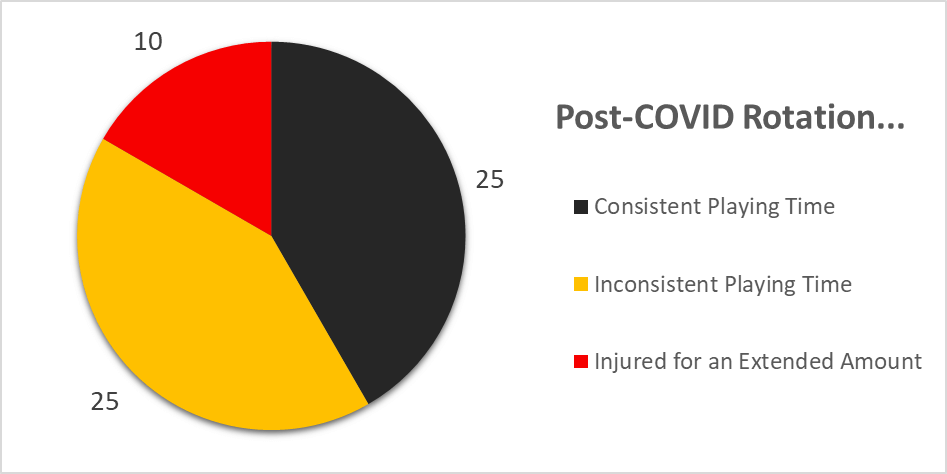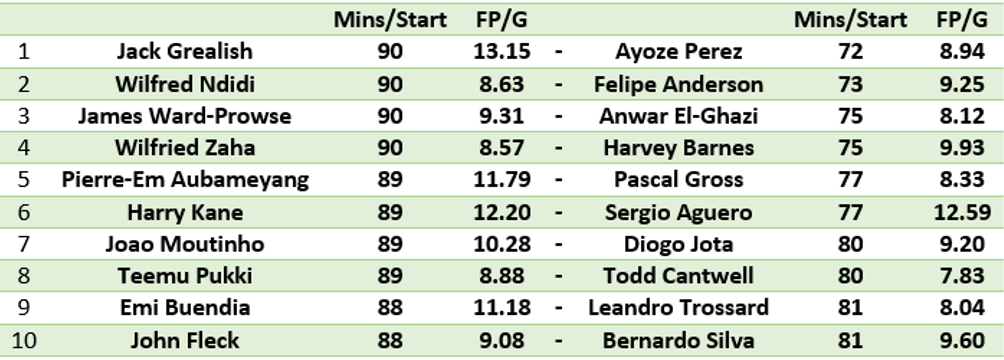Die Premier League ist fast zurückgekommen!
That’s “The Premier League has almost returned”, for those of you who haven’t lived and breathed all things German in the absence of any other football for the past month. Yes, with the English game in hiatus, many of us resorted to the Bundesliga for our football fix. At least until Bayern beat Dortmund two weeks ago to all but seal their 78th title in a row.
But we suffer no more. The Premier League’s return is imminent, and with that, our minds can return to the safety and warmth of Fantrax Fantasy management. The big question, though, is what can we learn from ze Germans? Is the Bundesliga’s post-COVID world a blueprint for what to expect in England? Let’s take a look at some numbers, and see if we can find an edge over fantasy league opponents…
WARNING: This is a long read! If you just want the headlines, feel free to skip down to the very bottom where I’ve summarized the key points 🙂
Looking for a better way to play Fantasy Premier League? The Fantrax draft-style EPL Fantasy Soccer Leagues are the most feature-rich, easy-to-use, and customizable in the industry. Sign up now to enjoy the incredible experience that is a Fantasy EPL Draft League on Fantrax!
Yes, Those Home Field Advantage Stories Are Still True
After just two weeks of Bundesliga football there started to appear stories online about how home field advantage had been eradicated. Those stories were ridiculous. With such little data, it was impossible to say. Well, five weeks down, the sample size is still way too small…butttttt….the narrative is holding true. It should also be noted that the numbers reflect a logical idea. With no fans, the added motivation for the home side, and perhaps extra intimidation for the away side, no longer exists, thus, no more home-field advantage.
(Note: there’s some great work on Twitter that is critical of these home-field advantage stories; check them out here and here).
H = Home, A = Away, PPG = Points per game, GPG = Goals per game, GCPG = Goals conceded per game
Strangely, the early data appears to show that the playing field isn’t just level now…it’s actually flipped such that there is an Away Field Advantage! And not only that, but the effect is even greater than for the original home field advantage! Just 10 wins from 45 games for the home teams in the Bundesliga so far, and half of those came courtesy of Bayern, Dortmund, and Monchengladbach (the top 3). It’s an interesting finding, and we are likely to see this decrease in the coming weeks with more data, but it’s very possible that there will be no such thing as home-field advantage in the post-COVID Premier League.
What this means for your Fantrax Fantasy EPL team…
Everton, Tottenham, Manchester United, and Aston Villa have enjoyed much happier days at home than on their travels this season, so it would make sense that these teams are hurt most by an absence of home-field advantage. Does that make Richarlison, Son, Bruno Fernandes, and Grealish expendable? Probably not (though everyone has their price!). But it should make you think twice about wavering in an El Ghazi at home to Sheffield United, or a Ben Davies at home to West Ham. These fixtures may be trickier than they appear.
Back in the gameweek 23 Stats Corner article I actually listed the 10 players with the highest home and away splits in the league. There are some big names on there that may be difficult to acquire (Salah, Alli), as well as two players out for the season (Riccy P and Deulofeu), but two names that may be of interest are Todd Cantwell and John Fleck. Their away performances have been dragging down some excellent home returns, so they could be two players set to benefit big time over the next couple of months.
Good Teams Stay Good… But The Rest… Who Knows?!?
In the build-up to Dortmund’s first game back, TV pundit (and grossly underrated ex-footballer) Steve McManaman, said that the team were in “decent form”. This, of course, despite the fact that they had not played a game in over two months. It’s an easy mistake to make, given how important form is (or perceived to be?) in predicting an upcoming game. This goes for players too. We rightly check out the recent fantasy scores of players to try and pick up ones who are hot or to drop or trade ones who are not. But by the time the EPL is back, the break would have lasted longer than most off-seasons, which makes the return essentially a new, “mini” season. There is no logical argument to make for the idea of form, but can the numbers from Germany tell us anything of use?
W = win, D = draw, L = Loss. Order of teams is that of the league table prior to the break (i.e. March 12th). With form, the first letters reflects the most recent game. Green ticks have been assigned to changes of -3 to +3, whilst red crosses have been assigned to changes of -4 or +4 (or greater).
By and large, the good teams have remained good, whilst the rest is a mixed bag. Of the top 8, only Leverkusen’s form has changed by more than 3 points, but this is slightly misleading because pre-COVID they had been exceptional, earning 13 points from a maximum of 15. The 9 they have earned post-CVOID is still one of the best in the league. The interesting team here is Schalke, who, despite placing 6th pre-COVID, went into it on a horrendous run of form, and have somehow actually managed to get a little worse following it. Generally though, how the top teams were performing before the break is how they are performing after the break.
What this means for your Fantrax Fantasy EPL team…
The fact that good teams continue where they left off may not seem surprising at first glance, but it is important to note. Some pundits are already suggesting that the likes of Liverpool and Manchester City may be vulnerable to a few shocks when we get back into the swing of things next week, but if their German equivalents of Bayern and Dortmund are anything to go by, this is unlikely to be the case. So basically, don’t let those Arsenal and Everton players entice you in gameweek 30! And on the flip side of this, trust the big guns like City’s Silvas, Liverpool’s midfield, or some of United’s talent, to pick up where they left off.
Elsewhere, the “good form” of Arsenal, Crystal Palace, and Burnley can be ignored (and with it, the recent scores from the likes of Dani Ceballos, James McArthur, and Jay Rodriguez). The same is true for the “bad form” of Brighton and West Ham (and the poor returns from the likes of Leandro Trossard). This will be easy to do for the first few weeks, but come gameweek 34 you may find just find yourself using these numbers to help make some fantasy decisions. Don’t. Stay alert, control the numbers, and save your season.
The 5-Sub Rule Is Worse For Some Than Others
Whether the introduction of five substitutes is fair or not is a debate for another, fantasy-less world that nobody wants to be a part of. But what impact the rule has had on the game is important. There’s nothing worse than watching your fantasy team claw their way back into the match on the final game of the week, only for Brendan Rodgers to decide that both Ayoze Perez and Harvey Barnes could do with sitting out the final 30 minutes. There goes your final players, taking a potential 6 or so very crucial points from you…and earning you the loss. So is the new rule going to make things even more frustrating for the Fantrax fantasy manager?
The answer is yes…but it probably won’t be as bad as first feared. Despite teams utilizing all three subs pre-COVID a massive (but predictable) 96% of the time, thus far teams in the Bundesliga have only utilized all five subs post-COVID 86% of the time. (Quick shout out here to Fortuna Dusseldorf manager – and ex-Manchester City forward – Uwe Rosler, who may be the first person to ever carry out a quadruple substitution). And whilst the average time of the first three subs is, as expected, earlier than before, it is only marginal, and the average time of the 4th and 5th subs is the 81st and 82nd minute. All in all, this means that minutes lost to players being subbed off has increased by just 14 minutes, from 63 to 77. Not too shabby. Where this gets interesting, though, is in the types of substitutions made…
As the graphic above shows, the numbers of midfielders and forwards being substituted has increased in this expanded rule, but the numbers of defenders being substituted have pretty much stayed the same. Those extra two substitutes – when they are used – are being used from an attacking perspective.
What this means for your Fantrax Fantasy EPL team…
The value of defenders has to increase now, whilst the value of midfielders and forwards must drop slightly. The defensive duo of Maguire and Wan-Bissaka (subbed off 0 times and 1 time this season, respectively) may be a reliable way of getting in on the United hype that has been building. Similarly, Brendan Rodgers has only subbed a defender off 4 times this season and Leicester have a very nice run in from a defensive standpoint.
But what about the midfielders and forwards? Is there any insight there? Well, a golden rule of Fantrax management (in my opinion) is to never start a substitute. I wrote a thread last year on the topic that concluded as much, with the only possible exceptions from the big six teams being when Aubameyang and Hazard are benched. But now that there are more substitutes – even if the amount of playing time hasn’t changed drastically – it may be a different story. Gabriel Jesus, for one, is a player that even in just 10 minutes could score you double-digit points. Mason Greenwood (18 sub appearances), Moise Kean (17), and Divock Origi (17), may also be tempting options to play now. It’s still a risk, but the risk has without doubt been decreased slightly.
Rotation Isn’t Random
The 5-Sub rule has been introduced to help prevent the influx of injuries that is feared will come about due to the shortened and unusual “pre-season”. As discussed, this will likely have a negative effect (but a small one geared towards midfielders and forwards) on Fantrax fantasy management. Another potentially detrimental idea widely floated is that teams will rotate heavily in order to manage this increased injury risk. We have all felt the exasperation of Pep Roulette from time to time, but if all the managers in the league starting following suit then we might be in for a tricky couple of months! Let’s look at what we can gauge from the Bundesliga…
(Quick note: The Athletic published an excellent piece recently stating that injuries have not increased in the Bundesliga since its return).
The above data is based on the top 60 players in the Bundesliga prior to the league suspension, according to WhoScored rating (minimum 16 league starts). These players were then categorized as having consistent or inconsistent playing time for the 5 games prior to league suspension, and the 5 games post league resumption. Consistent playing time equated to 4 or more games in which they did one of the following: played the whole game, came on as a substitute, or went off as a substitute. Inconsistent playing time equated to a more varied mixture of these options. Players who did not play for 3 of these games are categorized as “Missing for an Extended Amount”
The figures above show that rotation is indeed occurring to a greater extent in the post-COVID Bundesliga, with consistent playing time players dropping from 63% to 50%. However, the fact that 25 out of 50 players still have a consistent playing time should be seen as positive news for Fantrax fantasy managers – it doesn’t seem like we’ll be living in a world of Pep Roulette! Bayern’s David Alaba and Robert Lewandowski have played all 450 minutes since the return, whilst Dortmund’s Raphael Guerreiro and Julian Brandt have started all five but been subbed off in four.
Rotation, it seems, is not a random pattern in which managers are taking it in turns to alternate their squad and keep everyone safe. It is likely more targeted than that; specifically employed for at-risk players. This will (hopefully!) make it easier to predict, at least after two or three games, when we get a sense of which players need their minutes managed. Of course, there are plenty of exceptions – Leverkusen’s Kerem Demirbay has played the full 90 twice, been subbed off once, subbed on once, and did not play at all once – but I think these numbers demonstrate that our fears of erratic rotation may not come to pass.
What this means for your Fantrax Fantasy EPL team…
So who might be the players with consistent playing time (preferably playing the full 90!)? A range of useful playing time metrics can be found here at fbref.com, but to save you the hassle, I’ve compiled the top 10 minutes per start amongst midfielders and forwards in the Premier League (minimum FP/G of 8; Togga scoring). I’ve also contrasted this with a selection of 10 other players which may be of interest.
The names on the left should have increased value, with their reliability a strong plus point heading into this unprecedented period of football. Other excellent options not quite making the top 10 were James Maddison, Jamie Vardy, Abdoulaye Doucoure, and perhaps surprisingly Raheem Sterling and Roberto Firmino (I’ve always thought of them as players who routinely get subbed…). Players in the right-hand column are ones to be wary of in terms of rotation, and this may be exacerbated in the post-COVID Premier League. Todd Cantwell is an interesting one though, as although his minutes per start is one of the lowest, he has started 25 matches for Norwich. Acquiring a close-to-guaranteed starter – even one that routinely gets subbed – may be worth it. Finally, Sergio Aguero’s name stands out for obvious reasons. Whilst there is no doubt that he is a fantastic player and fantasy option, it is almost certain that owners of his are going to face a lot of frustration regarding his playing time for the remainder of the season.
The Post-Match Interview
- The existence of home-field advantage in the post-COVID era is a contentious one. If it doesn’t exist – as the very early data from the Bundesliga suggests – then Everton, Tottenham, Manchester United, and Aston Villa players may be ones to avoid, as their teams could struggle to replicate their previous home performances.
- Football’s return is essentially like a new season, so any “form” from before can go out of the window. However, don’t trick yourself into believing that this means the big teams may take a few games to settle, and therefore could be in for a shock result or two. The Bundesliga’s big boys have, by and large, continued where they left off. So, yeah, leave those Arsenal and Everton waiver options where they are in gameweek 30.
- The introduction of the 5-sub rule probably won’t be as big a hindrance as first thought – only 14 more minutes of playing time is lost from potential fantasy players. But one important point to consider is that the extra substitutes that are occurring are almost exclusively that of midfielders and forwards. Which makes defenders extra valuable for the remainder of the season.
- There will, of course, be more rotation. But numbers from the Bundesliga suggest we won’t be experiencing a tidal wave of Pep Roulette. Rotation is likely to be more systematic than that, so check out players who are reliable either in terms of starts or in terms of minutes played when they do start – they should hopefully be some of the few to trust during the hectic finale.
Wondering who the best current Draft Premier League players are to target? Look no further than our Top 150 Player Rankings!
Follow me on Twitter for all the latest: @the_innergeek
Fantrax was one of the fastest-growing fantasy sites of 2019, and we’re not letting our foot off the pedal now! With multi-team trades, designated commissioner/league managers, and drag/drop easy click methods, Fantrax is sure to excite the serious fantasy sports fan – sign up now for a free year at Fantrax.com.


